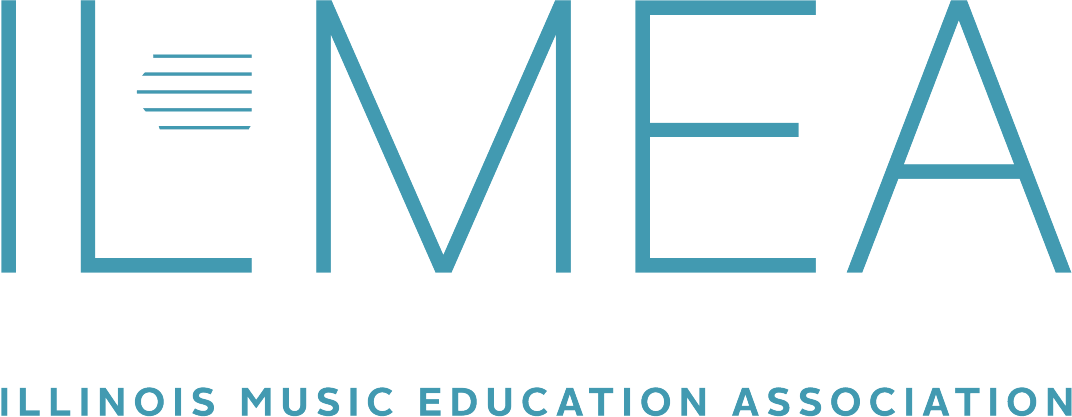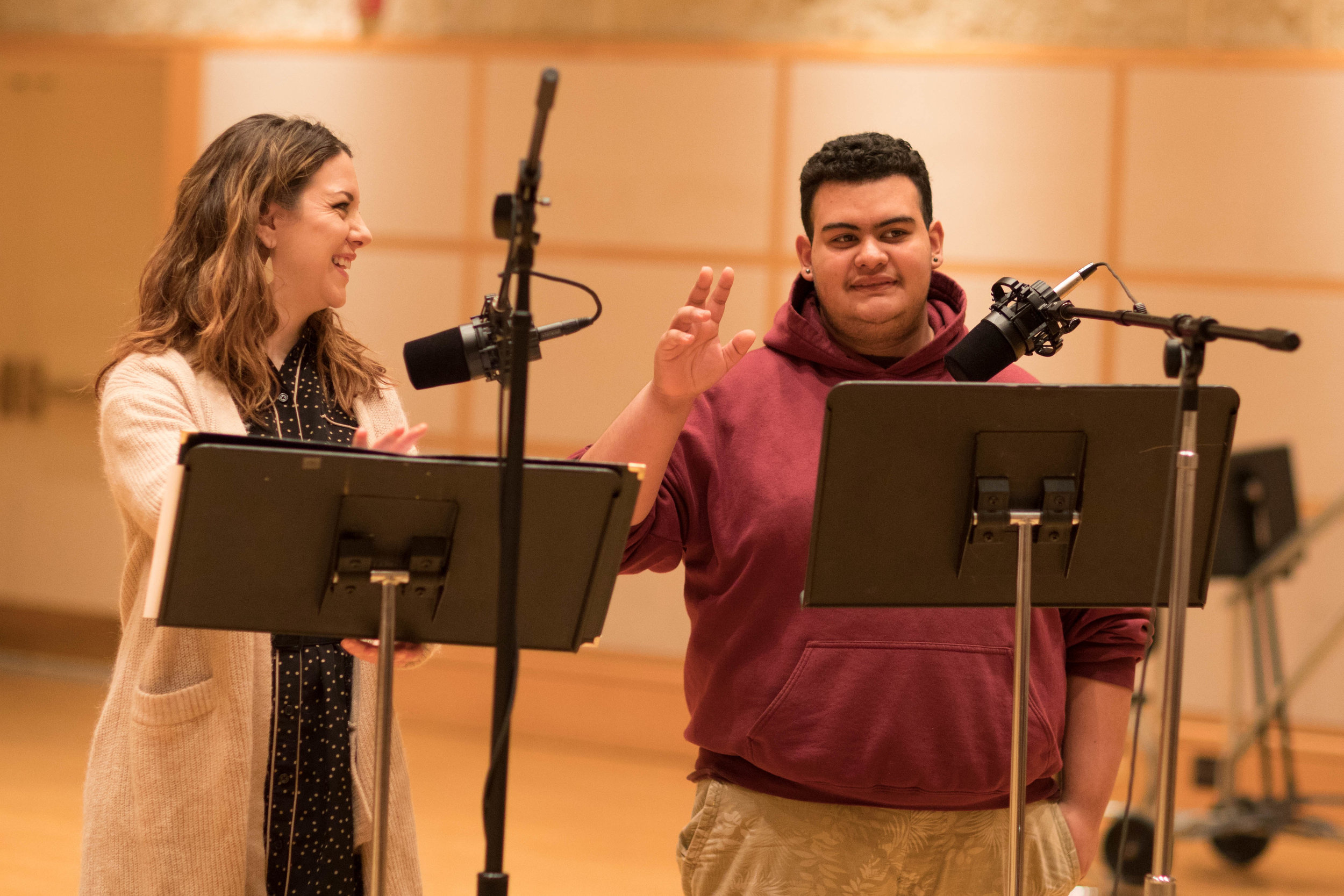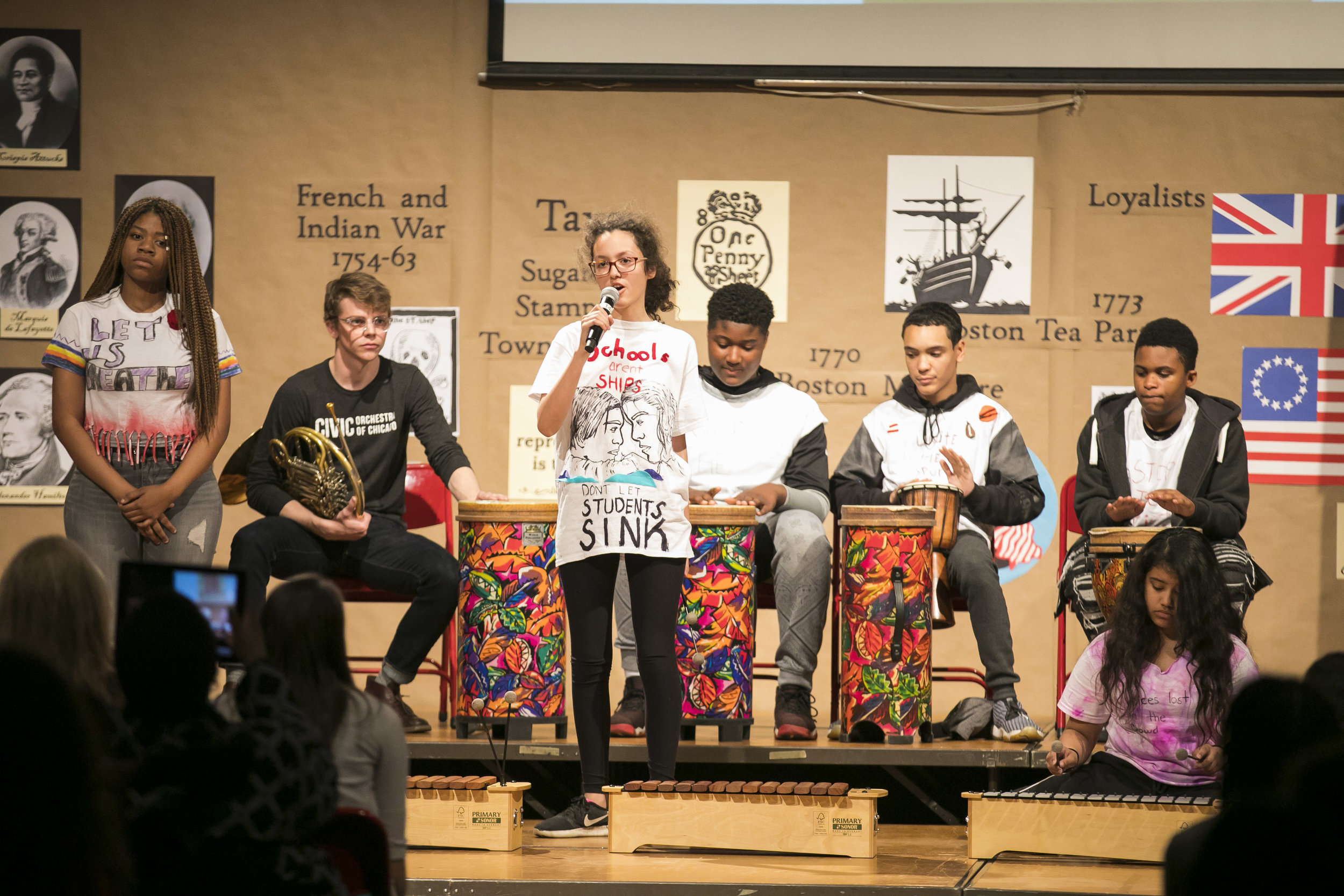When Maestro Riccardo Muti became Music Director of the Chicago Symphony Orchestra (CSO) in 2009, he made it clear he wanted his legacy to reach beyond the walls of Orchestra Hall, providing people all over Chicago with access to music. “The example that he cited was that we should go even into the juvenile justice system to engage with people who wouldn’t otherwise participate in what the Orchestra does,” says Jonathan McCormick, Director of Education & the Negaunee Music Institute at the CSO, which administers all of the education, training and community engagement initiatives of the Orchestra.
The mission of the Negaunee Music Institute is to connect people of all ages and diverse backgrounds to participate actively in the life of the CSO. Maestro Frederick Stock laid the foundation for the CSO’s educational programming with the formation of the Civic Orchestra of Chicago and the CSO’s concert series for children in 1919. Now umbrellaed under the Negaunee Institute, these programs commemorate their centennial seasons in 2018/19 under the leadership of CSO Zell Music Director Muti and Judson and Joyce Green Creative Consultant Yo-Yo Ma. In addition, the Institute has a vast array of longstanding programs that engage tens of thousands of children, schools, community partners and young musicians each year.
Tasked with Muti’s request to engage youth within the criminal justice system, McCormick and his staff formed a relationship with Storycatchers Theatre, an organization that assists incarcerated youth with telling their stories through musical theater.
“We learned from [Storycatchers] that one of the most effective ways to inspire and support young people in these circumstances was actually to engage them in a model that put them front and center and gave voice to their stories, doing so through the creation of something completely new, rather than this older paradigm of going in and explaining to them how important Mozart is,” says McCormick, adding “Don’t get me wrong – Mozart is incredibly important.”
In 2013, the Institute formalized a relationship with Sara Lee, Artistic Director of the Irene Taylor Trust. Founded in the U.K. in 1995, the Trust is committed to using collaborative music composition as a tool to positively impact people’s lives. Lee worked with the Institute to develop a week-long intensive at the Cook County Juvenile Temporary Detention Center, modeled after the Trust’s Music in Prisons program, now part of a fast-growing series of songwriting initiatives aimed at empowering youth and adults through creative expression.
“Much of the initial hours we spend with [the youth] are just showing them that, in fact, anybody can write a song and anybody can play and instrument,” says Lee. “What’s key for us is finding that one person in the room that has a starting point – that could be a poem, some lyrics or a drum beat – because once the bridge between the outside facilitators and the young men has been crossed, it becomes a much easier work space.”
A parent participates in a Lullaby Project recording session, alongside mezzo-soprano Sarah Ponder. | © Todd Rosenberg Photography
A year later, Lee came back to spearhead the Institute’s participation in the Lullaby Project, a program of the Weill Music Institute at Carnegie Hall which engages new parents in writing lullabies. And with Lee and Project Leader Rex Horan’s guidance, the Institute partnered with the non-profit support group Purpose Over Pain in 2017 to implement songwriting sessions for families affected by gun violence in Chicago. This relationship culminated in the first Concert for Peace, a collaboration between Ma and Father Michael Pfleger, Pastor at Saint Sabina Church in the Austin Gresham neighborhood. The annual concert features Ma with CSO and Civic Orchestra members playing symphonic arrangements of participants’ songs.
“What we’ve learned over the years is that songwriting is a great tool in almost any environment,” says McCormick. “The vehicle of the song itself is such a powerful tool. At the same time, we’ve been talking about how all of this work is part of an effort in the city to create peace. Of course, the Chicago Symphony Orchestra alone is not solving the gun violence issue or reforming the juvenile justice system, but we are trying to play our part. The resource that we have to make a difference is music.”
A cornerstone is the involvement of the Institute’s Civic Fellows, a highly selective group of 15 Civic Orchestra members who help administer the programs.
“The Fellows serve as ambassadors for the [Civic] Orchestra,” says James Hall, Manager of Community Programs & Civic Orchestra Engagement. “Yo-Yo is fond of saying you can’t really develop as a musician or an artist in isolation; you have to embrace yourself and the world around you. That’s the philosophy that guides a lot of the work of the fellowship. …We make the argument that in order to really be a fully developed artist, you need to be out in the world and engaging fully with people.”
These accomplished Classical musicians are often taken out of their comfort zone, not only by the communities they work with but by the musical demands of the songwriting initiatives. Lee and Horan encourage the Fellows to take the lead, assisting participants with writing lyrics, creating harmonies and melodies, orchestrating the songs and playing new instruments such as drum kit or electric guitar.
Hall says Classical music is powerful for many people, “but I think what’s interesting about these projects is that we don’t go in with the assumption that that’s what people need or want.” He notes that many of the songs draw on participants’ cultural backgrounds, influenced by R&B, Latin music, Hip-Hop and Rap. “What makes us uniquely suited to these things is that our musicians are at such a high level musically that we can write songs in a particular idiom that’s not in the Classical style and layer in sounds with classical instruments that you wouldn’t hear with a different group. It’s more about getting people in a room together who represent different perspectives. There’s something really special and valuable about that.”
Students from Agassiz Elementary and Civic Fellow Corin Droullard perform a protest song written as part of the CSO-Connect school partnership program. | © Todd Rosenberg Photography
An additional component to the Civic Fellows’ commitment is participation in CSO-Connect, an arts integration partnership with CPS schools blending music education and composition with subjects like history, science and math. CSO-Connect partners with 10 schools this year, most of which are fine and performing arts magnet schools. Manager of School & Family Programs Katy Clusen says these schools “were already really primed to do arts-integrated lesson development and teaching.”
Each year a new curriculum is developed in collaboration with another arts organization such as the Field Museum and Chicago Shakespeare Theater. This year, the Institute and the Chicago History Museum shared resources – which for the Orchestra includes the Fellows playing memorized chamber music, musical lectures and CSO School Concerts – to engage students in exploring their personal cultural heritage within the context of the history of Chicago.
A current partner is Innovations High School, an alternative school for students ages 16 to 21. Students wrote poems exploring the idea of personal transformation, using the repertoire of the CSO School Concert and the text of Joseph Campbell’s The Hero’s Journey as inspiration. With help from a Civic Fellow and a teaching artist, students fine-tuned their poems into song lyrics, selected pre-recorded instruments and beats and added their own singing, rapping or spoken word to produce their final tracks.
“Every school is functioning in its own ecosystem,” says Clusen. “What we like to provide to schools is a model and the ability to build leadership capacity among teachers. So, for schools that are under-resourced or who have not been able to implement arts integration, it’s really important that we identify those schools. …But there also needs to be a willingness on the part of the staff and administration to embrace a very progressive way of developing lessons and teaching students.”
Because these programs are primarily fueled by individual donors and foundations, data collection and evaluation tactics are markedly different than those required by school boards or other government agencies. According to McCormick, success is measured by client and participant testimonials, program attendance and compliance and the health of the Institute’s relationships with its partners, as well as survey data from the Fellows and CSO-Connect programs. “Without at least one key ally within that partner organization, there’s no chance of the work being successful,” says McCormick, citing Assistant Superintendent of Programs Michael Byrd as an example of someone who’s been vital to the program at the Illinois Youth Center Chicago (IYCC), a juvenile justice facility on the near West side.
“On my desk are the CDs of the last four years,” says Byrd. For him, the greatest sign of success is continued growth of the partnership, which now includes bringing IYCC residents on field trips to Symphony Center. “Some of these men would, I’d dare guess, have never gone to the Symphony in their entire lives if we hadn’t introduced them to this. I don’t know how much further I measure it.”
The Institute is clear that tracking or quantifying the long-term impact of its programs on academic achievement or recidivism, for example, is nearly impossible. “I would never even begin to make the claim that participation in a week-long musical project in any way makes it less likely to return to the system once you leave it,” says McCormick. “That would be an outlandish claim, but that doesn’t mean the work isn’t extremely valuable.”
“No more dwelling on the past. I’m now in first place when I used to be in last,” reads a poem written by “Michael” at IYCC. In the course of three hours, Michael developed his poem into a melody accompanied by three of his peers, who learned to play bass, drum kit and keyboard. In the same session, he learned an R&B piano riff he and Horan developed, to play alongside a rap by “Carl.” “My future’s bright; I’m locked up, but it’s time to fly,” Carl recites into a microphone as Michael plays.
“Our young men have such limited experiences of the world beyond their block,” says Byrd. “So, we want to put instruments in their hands. Music changes you. Music helps you express.”
Lauren Warnecke is a freelance writer based in Chicago. She is the dance critic at the Chicago Tribune and Editor of See Chicago Dance. Lauren’s writing has appeared in Chicago Magazine, Milwaukee Magazine, St. Louis Magazine and Dance Media publications, among others and she is an adjunct faculty member at Loyola University Chicago.
For more information on The Negaunee Music Institute, please visit www.cso.org/institute.




